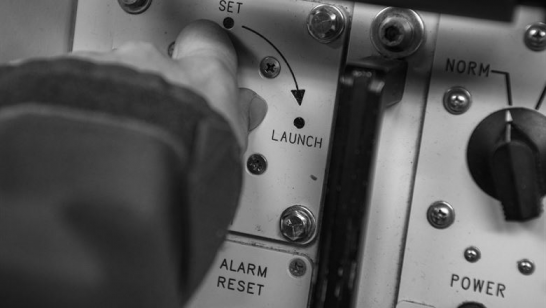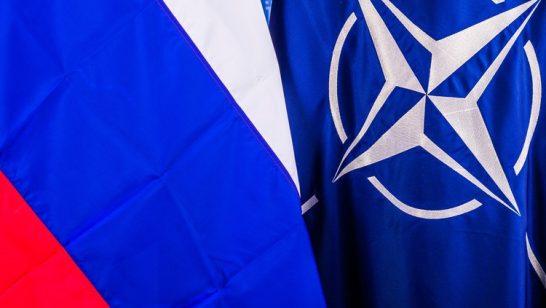
John J. Mearsheimer, R. Wendell Harrison Distinguished Service Professor of Political Science at the University of Chicago, has written a controversial analysis of the ongoing crisis in Ukraine, which neatly reveals why “realism” fails when applied dogmatically and without an adequate knowledge of the facts. The article, entitled “Why the Ukraine Crisis is the West’s Fault,” appeared in the September/October 2014 issue of Foreign Affairs [1].
“Putin’s actions should be easy to comprehend,” writes Mearsheimer. Ukraine is a “huge expanse of flat land that Napoleonic France, imperial Germany, and Nazi Germany all crossed to strike at Russia itself.” Since Ukraine serves as a “buffer state of enormous strategic importance to Russia … no Russian leader would tolerate a military alliance that was Moscow’s mortal enemy until recently moving into Ukraine.” By the same token, no “Russian leader [would] stand idly by while the West helped install a government there that was determined to integrate Ukraine into the West.” After all, “great powers are always sensitive to potential threats near their home territory.”
The argument is marred by two fatal flaws. First, by invoking past invasions, Mearsheimer goes beyond the analytical framework of realism, which assumes that “objective” threats would be recognized as such by any rational observer, and invokes Russian historical memory, ideology, and political culture—or perceptions. Once perceptions enter the picture, we leave the realm of realism’s logical rigor and introduce factors that contradict the objectivity and rationality assumption of realism and implode Mearsheimer’s theoretical framework. After all, the power of realism resides in its claim that all rational observers, regardless of nationality, would assess national interests and power relations in approximately the same way. If they do not, because values, norms, ideas, and the like get in the way, then realism amounts to the banal observation that power somehow matters in our assessments of international relations. Who could disagree?
The second problem with the argument is that is it based on non-facts or twisted interpretations of real facts. For starters, Napoleon crossed today’s Belarus, not Ukraine; imperial Germany couldn’t have crossed Ukraine to strike at Russia, because Ukraine in 1914 was part of Russia; Nazi Germany attacked not Russia but the Soviet Union in general and Soviet Ukraine and Soviet Belarus in particular, when its forces launched Operation Barbarossa on June 22, 1941. Mearsheimer might counter that this kind of criticism is picky and that his point is that three powers crossed Ukraine—“a huge expanse of flat land”—to attack Russia. But that image of Ukraine (and Belarus) is precisely the problem. Europe never consisted of aggressive states in the west, a powerless Russia in the east, and a “huge expanse of flat land” in between. Sometimes Russia incorporated that huge expanse; sometimes that huge expanse actually had a non-Russian political identity; and never was Belarus identical with Ukraine.
These elementary factual mistakes set the tone for the rest of the article. Thus, NATO is anything but an “impressive military alliance,” and everyone—from NATO, to the United States, to Europe, to Russia—knows it. Ever since NATO lost its raison d’etre with the end of the cold war and the collapse of the USSR, the alliance has been floundering, seeking a new rationale for its existence (and arguably finding it only after Russia invaded Crimea). Meanwhile, while American defense spending has remained high, that of the Europeans is declining, and almost no one in Europe or the United States can imagine the Europeans engaging in a concerted military action. Indeed, as I learned during a visit to NATO headquarters in June 2014, NATO officials make no secret of their fear that, if a member state such as Estonia were to be invaded, no other member state would rush to its assistance and the famed Article 5, which only encourages member states to respond militarily, would be revealed as hollow.
It may be useful to look more closely at NATO Treaty’s Article 5, which states that in case of an armed aggression the Allies “will assist the Party or Parties so attacked by taking forthwith, individually and in concert with the other Parties, such action as it deems necessary, including the use of armed force”. The key element is the last line, which means two things: first, that a member state responds to an armed attack based on its own estimation of what it “deems necessary.” Second, doing nothing or convening a conference could be what it deems necessary. Given European insistence that war is “unthinkable,” given declining European defense budgets, and given the unlikelihood that any NATO country would commit troops to the defense of a strategically insignificant country such as Estonia, it is hard not to conclude that NATO is a paper tiger.
A strict application of realist logic should lead rational Russian leaders to reach the above conclusion about NATO. After all, if NATO is a paper tiger, what difference would its “moving into Ukraine” make? Russia’s prestige might be affected, but that, too, shouldn’t matter in a strictly realist account. Due to this failing, Mearsheimer must bring perceptions into the argument by the back door: NATO enlargement matters, not because NATO matters as an impressive military alliance, but because the memory of NATO’s role in the cold war matters to Russians suffering from an ideologically and culturally twisted version of reality. Besides contradicting himself (and contradiction matters greatly to realists, who pride themselves on their logical rigor), Mearsheimer effectively opens the door to an alternative explanation of Russia’s behavior that emphasizes great-power ambitions—and which he regards as “wrong.”
Is it true that the West has been determined to incorporate Ukraine into NATO? Has Ukraine wanted to join the alliance? The answer to both questions, as Ukraine experts know, is a resounding no. Neither NATO nor any major NATO country has ever stated that Ukraine should be incorporated immediately into the alliance. And for good reason: they understood that no NATO member state would invoke Article 5 and rush to Ukraine’s assistance in case of an attack by Russia. True, the North Atlantic Council stated the following at its Bucharest summit of April 3, 2008: “NATO welcomes Ukraine’s and Georgia’s Euro-Atlantic aspirations for membership in NATO. We agreed today that these countries will become members of NATO […] We will now begin a period of intensive engagement with both at a high political level to address the questions still outstanding pertaining to their Membership Action Plan applications”. The first line is about as squishy an endorsement of Ukrainian membership as one can imagine. But the second—“We agreed today that these countries will become members of NATO”—is profoundly non-committal, employing the future tense (“will become”) without any specificity whatsoever. I submit that no rational leader, or analyst, could possibly interpret these words as a ringing endorsement of Ukraine’s immediate membership in NATO. All the more so as Ukraine has never acceded to the Membership Action Plan. While all pre-Yanukovych Ukrainian governments have cooperated with NATO’s Partnership for Peace program—never eliciting more than a yawn from Moscow—only President Viktor Yushchenko tried, and failed, to have Ukraine accede to the MAP in 2008. Since then, Ukraine’s relationship with NATO has been on the back burner. Under the three years’ reign of Viktor Yanukovych, it disappeared altogether from the policy agenda of both Ukraine and the West. Indeed, Yanukovych even signed a law in 2010 affirming Ukraine’s non-aligned status. Public opinion surveys in Ukraine consistently showed that no more than a fifth of the population ever desired NATO membership. That changed only after the outbreak of Russia’s war with Ukraine in 2014.
Is it at least true that the West was “determined to integrate Ukraine into the West”? Until the Maidan Revolution broke out in late 2013, Western policy toward Ukraine had been characterized by “fatigue” since about 2008, when the reformist energy of the Yushchenko government fully dissipated. Even before that, there was never any talk in Western policy circles of including Ukraine in the European Union. Indeed, the EU’s development of its Eastern Partnership program and its offer of an Association Agreement to Ukraine were precisely intended to address that policy lacuna without promising Ukraine even the prospect of membership in the EU. Indeed, the striking thing about the EU has been its reluctance for the last two decades to state that Ukraine could, even at some time in the distant future, become an EU member.
Is it, finally, even true that the West was determined to transform Ukraine into a pro-Western democracy? Mearsheimer cites two bits of evidence for this: the United States has given Ukraine more than $5 billion of technical assistance since 1991 and the National Endowment for Democracy “has funded more than 60 projects aimed at promoting civil society in Ukraine.” Disregard the fact that $5 billion over 23 years is not an impressive amount, or that civil society projects, in Ukraine and elsewhere, have done little to promote actual civil society. Far more distressing, and remarkable, for a realist, Mearsheimer ignores the actual state of relations between the United States and Europe and Ukraine. The West did nothing as the Leonid Kuchma regime slid toward authoritarianism in the late 1990s, as the Yushchenko government abandoned its democratic reform agenda and focused only on internecine squabbling, and as the Yanukovych regime rolled back civil rights and established an authoritarian regime. True, some Western policy makers rhetorically supported the Maidan Revolution and insisted that Yanukovych seek a compromise with the democratic revolutionaries; but many more did not. None actually provided any material assistance to the Maidan. And no Western presidents or prime ministers called on Yanukovych to step down during the revolution. Once he abandoned his office, many Western policymakers welcomed his move—but that was after, and not before, the fact.
Amazingly, Mearsheimer believes the West tried to turn Ukraine into its “bastion.” This would be news to Ukrainians, who have consistently accused the West of doing little to nothing to advance Ukraine’s integration into Western institutions. Pro-Russian Ukrainians, like Putin, will agree with Mearsheimer, but they do so not because the facts are on their side, but because their historical memories, political culture, ideological predispositions, and Soviet-era perceptions incline them to misread the facts and see threats where there are none. Unsurprisingly, Mearsheimer fails to mention that Putin explicitly abrogated the 1994 Budapest Memorandum on Security Assurances in justifying his annexation of the Crimea.
Inasmuch as some—and only some—Western policy makers are arguing for turning Ukraine into a Western bastion today, it is due to the fact that Russia annexed Crimea and unleashed war in eastern Ukraine. Mearsheimer is wrong to suggest that Western outrage is due to a “flawed view of international politics” based on “such liberal principles as the rule of law, economic interdependence, and democracy.” In fact, Western elites who resolutely oppose Russian aggression are acting on strictly realist principles, recognizing that Russia’s invasion of Ukraine poses a direct threat to Western security and stability.
Despite being wrong, Mearsheimer’s analysis does offer a potential approach to solving the crisis: “There is a solution to the crisis in Ukraine, however — although it would require the West to think about the country in a fundamentally new way. The United States and its allies should abandon their plan to westernize Ukraine and instead aim to make it a neutral buffer between NATO and Russia, akin to Austria’s position during the Cold War.”
Mearsheimer thinks his solution would require a change in the West’s thinking about Ukraine. In reality, since the United States and its allies never had a “plan to westernize Ukraine,” there is nothing for them to abandon. Since “Western leaders” have comfortably coexisted with every Ukrainian administration, there is no reason to think that they would “support an anti-Russian regime” in Kyiv. Since Ukraine’s governments have always sought good relations with both Russia and the West—Mearsheimer’s ignorance of the fact that no Ukrainian government has ever been anti-Russian is shocking—Ukraine has been, is, and will be amenable to some form of neutral or non-bloc status, as long as its security is guaranteed. Ukrainians’ skepticism about any such status derives primarily from the fact that they believe, correctly, that Russia—and especially Putin—cannot be trusted. Since Putin tore up the Budapest Memorandum, it’s obvious to Ukrainians that no document could possibly suffice to provide security guarantees. Hence their current interest in NATO membership. Hence their belief that Ukraine must enhance its own armed forces as the only long-term guarantee of its security.
Mearsheimer’s plan requires little change in the West’s and Ukraine’s thinking. But it would require Putin to think differently and abandon the very predilection Mearsheimer pooh-poohs: his “long-standing desire to resuscitate the Soviet empire.” Whether or not Putin can do so will be the test of realism’s persuasiveness as a theory and the major challenge for the West’s ability to cope with Russian imperialism.
[1] www.foreignaffairs.com/articles/141769/john-j-mearsheimer/why-the-ukraine-crisis-is-the-wests-fault
The opinions articulated above represent the views of the author(s), and do not necessarily reflect the position of the European Leadership Network or any of its members. The ELN’s aim is to encourage debates that will help develop Europe’s capacity to address the pressing foreign, defence, and security challenges of our time.



